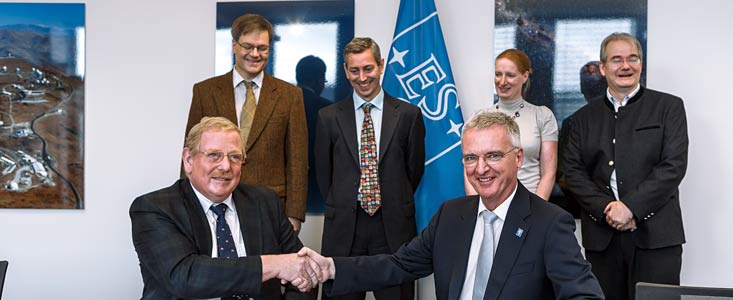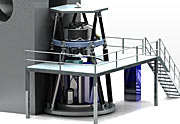Anúncio
Assinado acordo da câmara MICADO para o E-ELT
18 de Setembro de 2015
O ESO assinou um acordo com um consórcio de institutos europeus [1] para a concepção e construção da câmara MICADO (Multi-AO Imaging Camera for Deep Observations), um dos primeiros instrumentos para o European Extremely Large Telescope (E-ELT). A MICADO será a primeira câmara do telescópio gigante e levará o poder da óptica adaptativa ao próximo nível.
O acordo foi assinado por Reinhard Genzel, Diretor do Max-Planck-Institut für extraterrestrische Physik, em representação do consórcio, e Tim de Zeeuw, Diretor Geral do ESO, numa cerimónia que teve lugar na Sede do ESO a 18 de setembro de 2015 e que contou com a presença do Investigador Principal da MICADO, Ric Davies.
Desde o momento da primeira luz, a MICADO equipará o E-ELT com a capacidade de efectuar imagens limitadas por difração nos comprimentos de onda do infravermelho próximo. O design da MICADO nasceu do desejo de uma alta sensibilidade e resolução, precisão astrométrica e duma espectroscopia com larga cobertura em comprimento de onda.
O design da MICADO foi optimizado para a câmara ser utilizada com o sistema MAORY (Multi-conjugate Adaptive Optics RelaY), um novo módulo de óptica adaptativa que opera em conjunto com a nova estrela guia laser do E-ELT, no entanto pode também trabalhar com outros sistemas de óptica adaptativa.
A MICADO permitirá aplicar a resolução máxima do telescópio gigante em muitas áreas atuais da investigação, que incluem a obtenção de imagens da estrutura detalhada de galáxias a elevado desvio para o vermelho, o estudo de estrelas individuais em galáxias próximas e, utilizando o seu modo de coronógrafo, a descoberta e caracterização de exoplanetas. A MICADO constituirá também uma ferramenta única poderosa para explorar o meio onde as forças gravitacionais são extremamente elevadas, tal como o meio próximo do buraco negro supermassivo que se encontra no centro da nossa galáxia, a Via Láctea.
Para além do seu papel principal como câmara, a MICADO inclui ainda um espectrógrafo de fenda única, ideal para obter espectros de objetos compactos. Com este modo, o instrumento poderá ser utilizado para abordar diversas áreas da astronomia, tais com a medição de massas de buracos negros centrais de galáxias próximas a partir das velocidades das suas estrelas e a observação de galáxias a elevado desvio para o vermelho no intuito de se calcular as suas idades, composição química e histórias. O instrumento obterá igualmente espectros de supernovas produzidas pela primeira geração de estrelas massivas no Universo.
A MICADO é o culminar de um extenso trabalho de desenvolvimento executado tanto pelo ESO como pela comunidade ao longo de muitos anos. Mais particularmente, estudos preliminares do instrumento foram iniciados no ESO por Sandro D'Odorico.
Notas
[1] O consórcio MICADO é composto por: MPE: Max-Planck-Institut für extraterrestrische Physik (Alemanha); MPIA: Max-Planck-Institut für Astronomie (Alemanha); USM: Universitäts-Sternwarte München (Alemanha); IAG: Georg-August-Universität Göttingen/Georg-August-Universität; Göttingen Stiftung Öffentlichen Rechts (Instituição Executiva: Instituto de Astrofísica) (Alemanha); NOVA: Escola de Investigação em Astronomia holandesa (Nederlandse Onderzoekschool voor de Astronomie) (Holanda); CNRS/INSU: Centre National de la Recherche Scientifique/Institut National des Sciences de l’Univers (representando os laboratórios LESIA, GEPI e IPAG) (França); A*: Uma parceria austríaca representada colectivamente pela Universidade de Viena (A parceria A* compreende a Universidade de Viena, a Universidade de Innsbruck, a Universidade Graz, a Universidade de Linz e a RICAM Linz [Academia de Ciências austríaca]. Contribuições ao MICADO vêm de Viena, Innsbruck, Graz e Linz.) (Áustria), e INAF-OAPD: Instituto Nacional de Astrofísica do Observatório de Pádua (Itália).
Links
- Página web da MICADO no ESO.
- MICADO: the E-ELT Adaptive Optics Imaging Camera (Davies et al., 2010)
- MICADO (Max-Planck-Institut für extraterrestrische Physik)
- MICADO na Universität Göttingen
Contactos
Ric Davies
MICADO Principal Investigator
Max-Planck-Institut für extraterrestrische Physik
Garching bei München, Alemanha
Tel: +49 89 30000 3298
E-mail: davies@mpe.mpg.de
Hannelore Haemmerle
MPE Press Officer
Max-Planck-Institut für extraterrestrische Physik
Garching bei München, Alemanha
E-mail: hanneh@mpe.mpg.de
Suzanne Ramsay
ESO Project Scientist
Garching bei München, Alemanha
Tel: +49 89 3200 6665
Emails: sramsay@eso.org
Richard Hook
ESO Public Information Officer
Garching bei München, Alemanha
Tel: +49 89 3200 6655
Telm: +49 151 1537 3591
Email: rhook@eso.org
Sobre o anúncio
| Id: | ann15068 |
Our use of Cookies
We use cookies that are essential for accessing our websites and using our services. We also use cookies to analyse, measure and improve our websites’ performance, to enable content sharing via social media and to display media content hosted on third-party platforms.
ESO Cookies Policy
The European Organisation for Astronomical Research in the Southern Hemisphere (ESO) is the pre-eminent intergovernmental science and technology organisation in astronomy. It carries out an ambitious programme focused on the design, construction and operation of powerful ground-based observing facilities for astronomy.
This Cookies Policy is intended to provide clarity by outlining the cookies used on the ESO public websites, their functions, the options you have for controlling them, and the ways you can contact us for additional details.
What are cookies?
Cookies are small pieces of data stored on your device by websites you visit. They serve various purposes, such as remembering login credentials and preferences and enhance your browsing experience.
Categories of cookies we use
Essential cookies (always active): These cookies are strictly necessary for the proper functioning of our website. Without these cookies, the website cannot operate correctly, and certain services, such as logging in or accessing secure areas, may not be available; because they are essential for the website’s operation, they cannot be disabled.
Functional Cookies: These cookies enhance your browsing experience by enabling additional features and personalization, such as remembering your preferences and settings. While not strictly necessary for the website to function, they improve usability and convenience; these cookies are only placed if you provide your consent.
Analytics cookies: These cookies collect information about how visitors interact with our website, such as which pages are visited most often and how users navigate the site. This data helps us improve website performance, optimize content, and enhance the user experience; these cookies are only placed if you provide your consent. We use the following analytics cookies.
Matomo Cookies:
This website uses Matomo (formerly Piwik), an open source software which enables the statistical analysis of website visits. Matomo uses cookies (text files) which are saved on your computer and which allow us to analyze how you use our website. The website user information generated by the cookies will only be saved on the servers of our IT Department. We use this information to analyze www.eso.org visits and to prepare reports on website activities. These data will not be disclosed to third parties.
On behalf of ESO, Matomo will use this information for the purpose of evaluating your use of the website, compiling reports on website activity and providing other services relating to website activity and internet usage.
Matomo cookies settings:
Additional Third-party cookies on ESO websites: some of our pages display content from external providers, e.g. YouTube.
Such third-party services are outside of ESO control and may, at any time, change their terms of service, use of cookies, etc.
YouTube: Some videos on the ESO website are embedded from ESO’s official YouTube channel. We have enabled YouTube’s privacy-enhanced mode, meaning that no cookies are set unless the user actively clicks on the video to play it. Additionally, in this mode, YouTube does not store any personally identifiable cookie data for embedded video playbacks. For more details, please refer to YouTube’s embedding videos information page.
Cookies can also be classified based on the following elements.
Regarding the domain, there are:
- First-party cookies, set by the website you are currently visiting. They are stored by the same domain that you are browsing and are used to enhance your experience on that site;
- Third-party cookies, set by a domain other than the one you are currently visiting.
As for their duration, cookies can be:
- Browser-session cookies, which are deleted when the user closes the browser;
- Stored cookies, which stay on the user's device for a predetermined period of time.
How to manage cookies
Cookie settings: You can modify your cookie choices for the ESO webpages at any time by clicking on the link Cookie settings at the bottom of any page.
In your browser: If you wish to delete cookies or instruct your browser to delete or block cookies by default, please visit the help pages of your browser:
Please be aware that if you delete or decline cookies, certain functionalities of our website may be not be available and your browsing experience may be affected.
You can set most browsers to prevent any cookies being placed on your device, but you may then have to manually adjust some preferences every time you visit a site/page. And some services and functionalities may not work properly at all (e.g. profile logging-in, shop check out).
Updates to the ESO Cookies Policy
The ESO Cookies Policy may be subject to future updates, which will be made available on this page.
Additional information
For any queries related to cookies, please contact: pdprATesoDOTorg.
As ESO public webpages are managed by our Department of Communication, your questions will be dealt with the support of the said Department.





